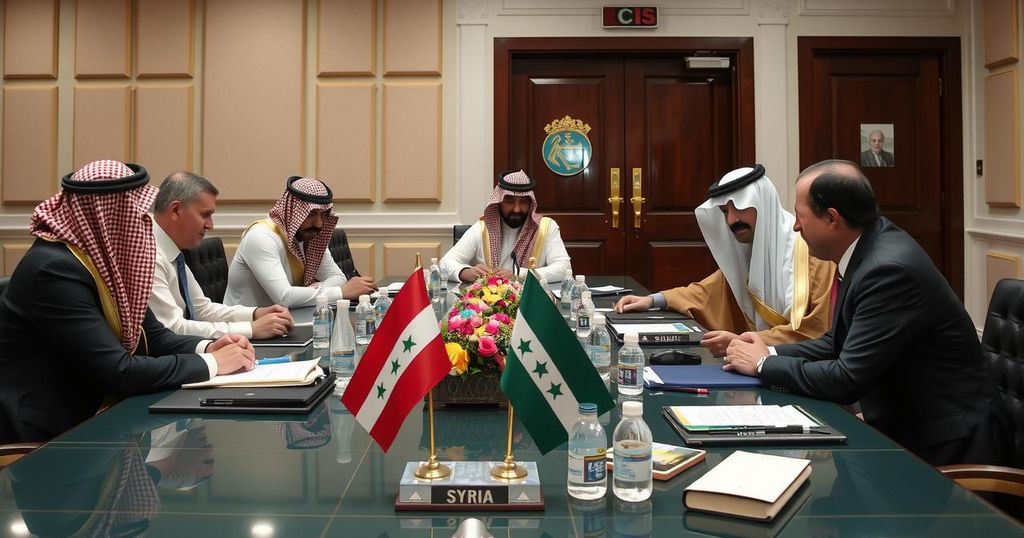Diplomats from Europe and the Middle East convened in Saudi Arabia to discuss post-Assad Syria, focusing on governance and sanctions relief. The talks included Arab officials and international representatives, addressing the humanitarian crisis from over a decade of conflict. Saudi Arabia aims to play a leadership role in Syria’s recovery despite ongoing sanctions, with implications for regional power dynamics.
Top diplomats from the Middle East and Europe gathered in Riyadh for talks focusing on stabilizing Syria following the overthrow of Bashar al-Assad. The discussions took place in two sessions: one with Arab officials and the other including representatives from Turkey, France, the European Union, the United Kingdom, and the United Nations. The meeting aimed to address the governance challenges in Syria under its new leadership, Ahmed al-Sharaa, as he sought relief from sanctions imposed by Western powers since 2011 due to Assad’s oppressive regime.
With over 500,000 casualties and millions displaced over thirteen years of conflict, the need for humanitarian and economic support for Syria is urgent. The European Union has indicated the potential easing of sanctions if the new Syrian government demonstrates commitment to inclusive governance and the protection of minority rights. Saudi Arabia, previously an opponent of Assad, is now attempting to facilitate Syria’s recovery post-conflict and has recently provided relief supplies to the country.
This summit underscores Saudi Arabia’s ambition to lead regional coordination in Syria’s recovery efforts, though the extent of resources allocated and the effectiveness of circumventing ongoing sanctions remain to be seen. Furthermore, the meeting was a continuation of discussions initiated in Jordan last month, signaling the international community’s sustained engagement with Syria amidst evolving geopolitical dynamics.
While nations like Turkey and Qatar have already recognized the new Syrian administration, Saudi Arabia is adopting a more measured approach. Experts suggest that Riyadh’s active participation in the talks may enable it to strengthen its influence within Syria, traditionally dominated by Turkish and Qatari interests. The outcome of these dialogues will be pivotal for Syria’s future governance and regional stability.
The talks on Syria come in the aftermath of the civil war that began in 2011, which resulted in an estimated 500,000 deaths and mass displacement. Following Bashar al-Assad’s fall, the Syrian government, now led by Ahmed al-Sharaa, is seeking to engage the international community for sanctions relief while attempting to establish governance that is inclusive and stable. The European Union and the United States have imposed sanctions on Syria over human rights abuses, which may be reevaluated under new leadership. Saudi Arabia, having historically opposed Assad’s regime, is now positioning itself as a key player in supporting Syria’s transition and recovery efforts.
In conclusion, the recent diplomatic discussions held in Riyadh represent a strategic initiative by Arab and European powers to support Syria in the aftermath of its prolonged conflict. The potential easing of sanctions hinges on the new regime’s moves toward inclusive governance, highlighting the delicate balance between humanitarian support and political conditions. Saudi Arabia’s leadership role in these efforts is emphasized by its commitment to revitalizing Syria’s economy and fostering stability in the region, along with the challenges presented by existing sanctions and regional influences from Turkey and Qatar.
Original Source: www.voanews.com






